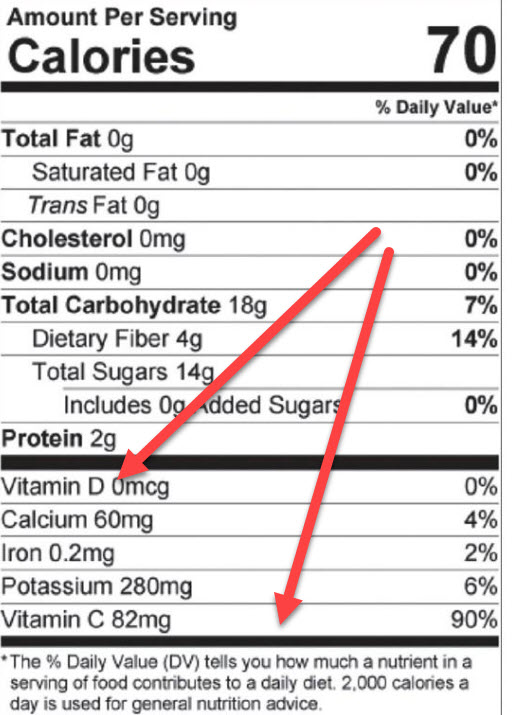Vitamin D Deficiency And The Connection To Your Waistline

There’s more and more research coming out all the time on the role Vitamin D plays in metabolic and immune functions. Now let me start by saying I typically don’t read too much into studies where scientists isolate an individual vitamin in attempts to demonstrate a particular benefit. This is what I often refer to as “nutrition-ism” where food manufacturers pay big bucks to have researchers attempt to demonstrate a health benefit with their processed food product.
The whole processed food industry is suspect in my opinion anyways. Just like the whole idea of “fortifying” or enriching foods with vitamins, minerals, and fiber can make low quality food products appear healthy when they’re anything but. They’ve been duping us with food labels for years when it comes to vitamins especially.
Have you ever really studied a food label for something like crackers? Supposedly, we can get 90% of our Vitamin C needs in the example below, but interestingly enough they don't even try to convince us about Vitamin D.

I'm not buying this 90% stuff no way, no how. There’s no denying that Vitamin C can be fortified into a food product but it’s NEVER isolated in nature where it's made by our Creator. We get Vitamin C naturally when we consume things like fruits and vegetables, but it’s packaged up with a multitude of other phytonutrients that all work together.
Scientists can’t fully explain how all these phytonutrients work together, but it’s obvious that they do.
This isn’t an argument against supplementation either, which I still believe is beneficial and use myself. Due to issues with the depletion in nutrients from our soil today and a host of other reasons that extend the scope of this article, I’m going with supplementation in my diet on top of eating mostly natural whole foods.

Having said all that, there is some really interesting research coming out now in regard to Vitamin D that has caught my attention. Research that points to the suggestion that if there’s one vitamin you should definitely consider supplementing, if nothing else, it would be Vitamin D.
There’s consensus amongst the top functional medicine physicians in this country that we have an alarming amount of Vitamin D deficiency going on in our society today. I think one of the hidden reasons for this is because it’s fat soluble and doesn’t fortify well at all back into foods.
Even with poor dietary habits you don’t see many individuals with Vitamin C or Vitamin B deficiencies for example. When was the last time you heard of someone having beriberi or scurvy?
We can completely alter a food, break it down, and add vitamins and minerals back in and it appears to the body can assimilate at least some vitamins from food this way but others not so much.
To understand why Vitamin D is different we can start by looking at the fact it’s more than just a vitamin, it’s also a hormone. Yep, you read that right. This might explain why is so darn important. And not just any hormone but one that plays a role in a remarkable range of body processes.
In the past 20 years, researchers have found Vitamin D receptors on up to 40 different tissues, including the heart, pancreas, muscles, immune system cells, and the brain. I think we’re going to hear a lot more about this vitamin in the months and years to come as scientists learn more about its role in the human body.
When it comes to maintaining a lean body composition, here’s what we already know about Vitamin D
- You’ll eat more and feel less satiated when Vitamin D levels are low.
When you have adequate Vitamin D levels, your body releases leptin, the hormone that sends the signal “we’re full, stop eating” to your brain. On the flip side, Vitamin D deficiency means less leptin and greater likelihood of over-eating.
One Australian study showed that people who ate a breakfast high in Vitamin D and calcium blunted their appetites for the next 24 hours. Vitamin D deficiency has also been linked to insulin resistance which as we know is precursor to type II diabetes and obesity.
- You’ll increase fat storage when Vitamin D levels are low.
When your Vitamin D levels are low it triggers parathyroid and calcitrol hormone levels to increase fat storage. One interesting Norwegian study I found showed that elevated parathyroid hormone secretion due to vitamin D deficiencies increased the risk of becoming overweight by over 40 percent!
- You’ll increase the likelihood of having a cortisol “pooch belly” when Vitamin D levels are low.
Vitamin D works in conjunction with calcium to reduce the production of cortisol. As we know, cortisol is a hormone that promotes fat storage around your midsection. This is a common indicator of increased inflammation in the body. And the majority of times when inflammation is elevated, Vitamin D levels are deficient. There is a direct correlation here. It is the chicken or the egg on which came first, but regardless they tend to roll together.
- You’ll lose more weight calorie for calorie
One study on Vitamin D found that a diet high in dairy helped people lose 70 percent more weight than a diet with the same number of calories but without the increased levels of Vitamin D and calcium. Granted you don’t have to consume a ton of dairy to get the same benefits. It’s the combination of Vitamin D and calcium which is the key. Foods like cold water fish, egg yolks, nuts, seeds, and green leafy vegetables also provide a significant amount of both nutrients.
Bottom line
While there will certainly be more research to come on this subject here’s the take away with what we know today.
There is no denying we have a Vitamin D deficiency problem with American children and adults. There is also no denying the alarming increases in the rate of type II diabetes and obesity. Is there a connection? I would have to think there certainly is.
With what we do know about Vitamin D and the roles it plays in the human body it would be in everyone’s best interest to make sure they consumed natural foods dense in both Vitamin D and calcium along with following a sensible approach with supplementation.
And oh yeah, obviously getting natural sunlight helps promote Vitamin D production in the body as well, so for a host of reasons get outside and chill for 20-30 minutes or go for a walk on a regular basis, weather permitting.
As I pick up on new research I’ll be sure to follow up and let you know what I find.
Shane Doll is a certified Charleston personal trainer, strength and conditioning coach, and founder of Shaping Concepts Personal Training Studios. He has over 24 years' experience with fitness coaching and consulting and specializes in training programs for middle age and mature adults. If you live in the Charleston, SC area you can schedule a no-obligations consultation.


